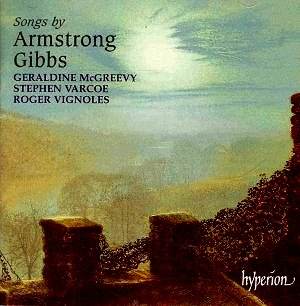Armstrong Gibbs now joins the pantheon of composers
allotted their own collection on Hyperion. The songs stand in
the lyric tradition of Michael Head. Gibbs' taste in poetry is
reflected in this selection. Masefield, Stevenson, Hardy, Housman,
Clifford Bax, Tennyson, Shanks and Watson are all here. He is
not quite the lavish ecstatic so stands clear of Gurney, Howells
and C. W. Orr. In his case the poignant blade of music honed by
words and words intensified by music probes closer to the surface.
Even so there are some mightily impressive songs here. Silver
is a song of slow dropping sleep while Mistletoe is
just as plangently ensorcelled as Silver.
Weaker settings include Hardy's Oxen where
there is an unsatisfactory sense of story. The song seems unrounded
by comparison with Vaughan Williams’ setting in Hodie.
By a bierside was also set by Gurney. Here it is given
a grand outing with tolling bells in the piano part and the echoing
words sung by Varcoe: ‘It is most grand to die’ are full of the
pomp and grandeur later found in William Alwyn's Hydriotaphia.
Although I take issue with Stephen Varcoe's tremulous
tendency and vibrato he is an intelligent singer who has clearly
lavished thought on the meaning of each song. Varcoe shares the
programme with the soprano Geraldine McGreevy, a well known voice
on BBC Radio 3. She is clear as a bell for the most part and adds
a lusciously fruity tone to Summer Night where she sounds
eerily like Janet Baker. She makes an ideal exponent of the summer
dew and dripping ecstasy of Take Heed Young Heart.
There are often very inventive piano parts in
Gibbs writing as in Ann's Cradle Song at the words ‘leap
fox; hoot owl’. The rushing and scampering is imaginatively reflected
in Five Eyes at the words ‘Jeckel and Jessup and one-eyed
Jill’. McGreevy it is who sings The Flooded Stream with
its evocative picture of moonlight and the burbling singing brook.
Her voice rises to loveliness for the words: ‘For I have a dream
of a springing well’.
Hypocondriacus is in the grand hunted
tradition of nightmare rides; think in terms of Schubert’s Erlkönig
and Foulds’ The Rider (Varcoe). Contrast this with
the plangent and melodious Neglected Moon to words by Arnold
Bax’s poet brother, Clifford! McGreevy in Arrogant Poppies
is clarion-clear and defiant with a fine ostinato established
by Vignoles the whole song brimming with vibrant lively character;
definitely a stand-out track. The song ends with some Vaughan
Williamsy melismatic vocalise.
In The Fields Are Full Gibbs takes a more
sober line than Gurney in his setting of the same words. The
Splendour Falls is manly and leonine - gestural and stormy.
Danger is a setting bleached with strangeness, alive with
galloping bacchic nocturnal fantasy creatures.
If you have a taste for Stanfordian ‘Yo-ho-ho’
then you will warm to the be-capstaned and sou’westered Four
Songs of a Mad Sea Captain from 1946. Warlock, Stanford and
a host of other turned their hands to this sort of writing. It
is not all to formula. Toll the Bell opens frighteningly
like the Rachmaninov Second Piano Concerto. Another bid for sheet
music popularity comes in The Ballad of Semmerwater with
its coaxing melody.
This is a typically tightly packed collection
only 21 seconds short of 80 minutes playing time. There are 36
songs here. Attention to detail is satisfying with all the words
printed legibly and complete. The notes are by Michael Hurd who
tells us that there are 162 songs in all. A remarkable 38 are
to words by Walter de la Mare. There are eleven de la Mare songs
here.
The durable and imaginative Hyperion catalogue
is Ted Perry’s legacy to the world. I hope that his son and the
management of the label will continue the mission he began and
which continues to unfold with every issue and reissue. I am hopeful
that the label which has been such a clarion call for the world
of song, and not just in English, will keep pushing the boundaries.
We need collections of the songs by Medtner, C.W. Orr, Michael
Head and Bax. The way lies clear.
As for the course of the rehabilitation of Gibbs'
own music we can hope, perhaps vainly, for a recording of the
as yet unperformed 1947 opera on Shakespeare's Twelfth Night
and, to complete the cycle of three symphonies, the major
1938 choral symphony Odysseus. The first and third symphonies
are still there on Marco Polo.
By the way, this composer's name is Cecil Armstrong
Gibbs. However he wanted to be known as Armstrong Gibbs. Good
to see that Hyperion have that point well under control. Gibbs
was originally destined to join the family business - makers of
toothpaste
Rob Barnett
If you are interested in details of the Armstrong
Gibbs Society please contact angela.aries@btinternet.com



